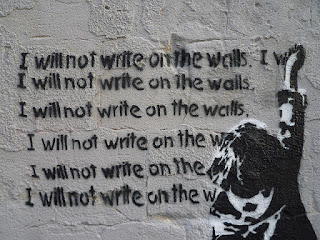The phrase “the writing is on the wall” is a signal that something unpleasant is about to happen.
Examples of use:
“The writing was on the wall for Jenners toy shop”
“Why the writing’s on the wall for Berlin’s murals”
“He said that firms like Cadbury have ‘seen the writing on the wall’ after the government introduced a sugar levy on drinks earlier this year.”
This phrase has a biblical origin; the book of Daniel, chapter 5, describes how writing appeared on the palace wall during a feast given by Belshazzar, the last king of Babylon, foretelling that he would be killed and the city ransacked [1].
The words written were MENE, MENE, TEKEL, PARSIN; Daniel interpreted this as ‘God has numbered the days of your reign and brought it to an end’ (MENE), ‘you have been weighed on the scales and found wanting’ (TEKEL), and ‘your kingdom is divided and given to the Medes and Persians’ (PARSIN).
[1] “writing on the wall, the” In The Oxford Dictionary of Phrase and Fable. Oxford University Press, 2005.
Photo credit: Barb Nerdy
I blog about editing, proofreading, and the English language.
Comments and suggestions are welcome.
Many of the phrasal verbs and idioms addressed in this blog were highlighted during an English conversation class I ran a few years ago. I’m grateful to those who attended this for helping me see my native language from a different perspective.
Most of the examples used are quotes from news articles. Click on the links (in yellow) to view the full article.

No comments:
Post a Comment